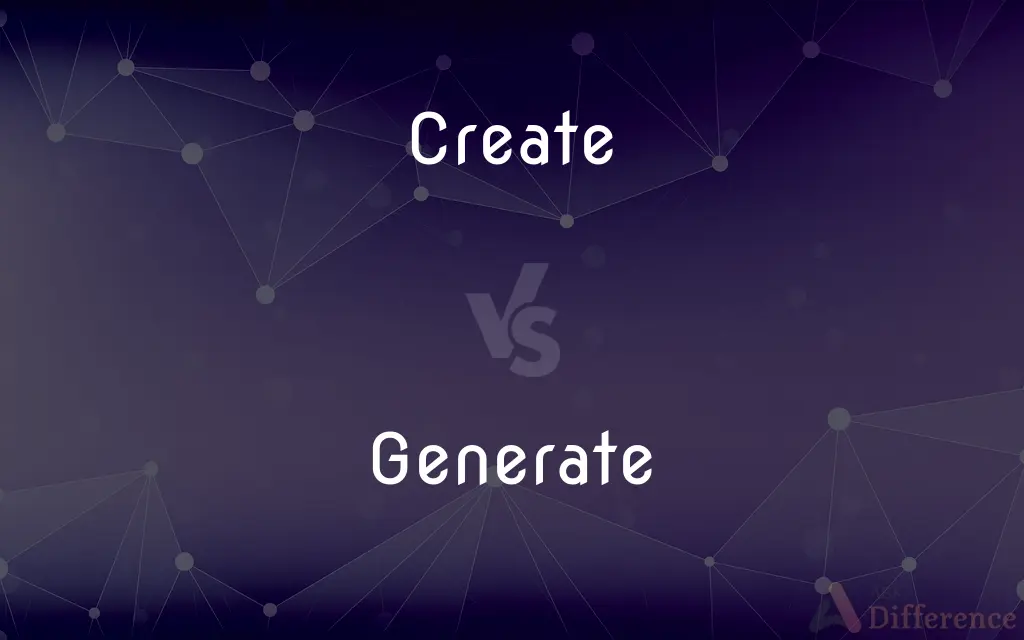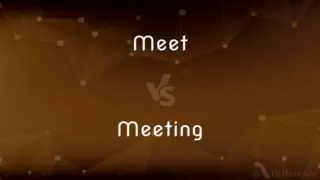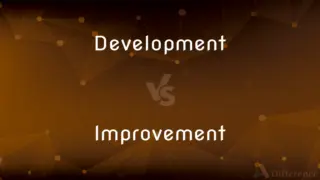Create vs. Generate — What's the Difference?
By Tayyaba Rehman & Urooj Arif — Updated on April 4, 2024
Create involves bringing something into existence with imagination or skill, focusing on originality. Generate often implies producing from a process or system, emphasizing quantity or speed.

Difference Between Create and Generate
Table of Contents
ADVERTISEMENT
Key Differences
Create is often associated with the act of bringing something new into existence through imagination, innovation, or artistic ability. It suggests a level of originality and uniqueness. On the other hand, generate refers to producing or bringing about something, usually as a result of a process, mechanism, or system. It emphasizes the act of production rather than the novelty of the outcome.
Creating something usually involves a deliberate, thoughtful process, often aimed at achieving a specific artistic or innovative outcome. For example, an artist creates a painting by envisioning something unique and then using their skills to bring that vision to life. Whereas, generating something can be more automatic or systematic, such as a computer generating random numbers or a company generating leads.
The term create is often used in contexts where the emphasis is on the quality, uniqueness, or originality of what is being made. It carries connotations of craftsmanship and artistry. On the other hand, generate might be used in contexts where the focus is on the quantity, efficiency, or speed of production, such as generating energy, reports, or data.
In the realm of intellectual and artistic endeavors, to create is to bring forth works that are original and expressive of individual or collective human experience. It involves a deep engagement with the medium and the message. Conversely, to generate often applies to the outcome of impersonal processes, like algorithms or natural phenomena, where the individual creator’s role is minimized or indirect.
While creation is often seen as a human-centric activity, deeply tied to notions of creativity and innovation, generating can encompass a wider range of activities, including those performed by machines, systems, or natural processes. This distinction highlights the difference in agency and intentionality between creating and generating.
ADVERTISEMENT
Comparison Chart
Definition
To bring something new into existence through innovation or skill.
To produce something from a process, system, or mechanism.
Focus
Originality, uniqueness, and artistic quality.
Quantity, efficiency, and the mechanism of production.
Context
Art, design, invention, writing.
Data production, energy creation, automated systems.
Connotation
Artistry, craftsmanship, innovation.
Production, reproduction, systematization.
Human Involvement
High, with a strong emphasis on personal or collective creativity.
Varied, can be high or low depending on the process or system.
Compare with Definitions
Create
To establish or found something.
They created a charitable foundation to support local causes.
Generate
To bring into existence through a mechanical process.
The algorithm generates a new random number every second.
Create
To bring something into existence through imaginative skill.
She creates beautiful sculptures from reclaimed wood.
Generate
To produce energy or power.
The plant generates electricity for the entire city.
Create
To cause something to happen or come into existence.
The new policy created a lot of confusion among the staff.
Generate
To cause something to arise or come about.
The announcement generated a lot of public interest.
Create
To design or invent something original.
The team created a new approach to solving the problem.
Generate
To create something by a natural or automatic process.
Our brainstorming session generated some fantastic ideas.
Create
To produce through artistic or imaginative effort.
The writer creates compelling stories that captivate readers.
Generate
To produce or create something in large quantities.
The new software can generate reports much faster.
Create
Bring (something) into existence
He created a thirty-acre lake
Over 170 jobs were created
Generate
Produce or create
Changes which are likely to generate controversy
The income generated by the sale of council houses
Create
Make a fuss; complain
Little kids create because they hate being ignored
Generate
To bring into being; give rise to
Generate a discussion.
Create
To cause to exist; bring into being
Created a new music school.
Generate
To produce as a result of a chemical or physical process
Generate heat.
Create
To give rise to; produce
That remark created a stir.
Generate
To engender (offspring); procreate.
Create
To produce through artistic or imaginative effort
Create a poem.
Create a dramatic role.
Generate
(Mathematics) To form (a geometric figure) by describing a curve or surface.
Create
To invest with an office or title; appoint
He was created a baron.
Generate
(Computers) To produce (a program) by instructing a computer to follow given parameters with a skeleton program.
Create
Created.
Generate
(Linguistics) In generative grammar, to construct (a sentence, for example) through the successive application of linguistic operations, rules, and conditions.
Create
(transitive) To bring into existence; (sometimes in particular:)
You can create the color orange by mixing yellow and red.
Generate
(transitive) To bring into being; give rise to.
The discussion generated an uproar.
Create
To bring into existence out of nothing, without the prior existence of the materials or elements used.
Generate
(transitive) To produce as a result of a chemical or physical process.
Adding concentrated sulphuric acid to water generates heat.
Create
To make or produce from other (e.g. raw, unrefined or scattered) materials or combinable elements or ideas; to design or invest with a new form, shape, function, etc.
Couturiers create exclusive garments for an affluent clientele.
Generate
(transitive) To procreate, beget.
They generated many offspring.
Create
(transitive) To cause, to bring (a non-object) about by an action, behavior, or event, to occasion.
Crop failures created food shortages and high prices; his stubbornness created many difficulties
A sudden chemical spill on the highway created a chain‐collision which created a record traffic jam.
Generate
To form a figure from a curve or solid.
Rotating a circle generates a sphere.
Create
(transitive) To confer or invest with a rank or title of nobility, to appoint, ordain or constitute.
Henry VIII created him a Duke.
Last month, the queen created two barons.
Under the concordate with Belgium, at least one Belgian clergyman must be created cardinal; by tradition, every archbishop of Mechelen is thus created a cardinal.
Generate
(intransitive) To appear or occur; be generated.
Create
(intransitive) To be or do something creative, imaginative, originative.
Children usually enjoy creating, never mind if it is of any use!
Generate
To beget; to procreate; to propagate; to produce (a being similar to the parent); to engender; as, every animal generates its own species.
Create
(transitive) In theatre, to be the first performer of a role; to originate a character.
Generate
To cause to be; to bring into life.
Create
To make a fuss, complain; to shout.
Generate
To originate, especially by a vital or chemical process; to produce; to cause.
Whatever generates a quantity of good chyle must likewise generate milk.
Create
(obsolete) Created, resulting from creation.
Generate
To trace out, as a line, figure, or solid, by the motion of a point or a magnitude of inferior order.
Create
Created; composed; begotten.
Hearts create of duty and zeal.
Generate
Bring into existence;
The new manager generated a lot of problems
The computer bug generated chaos in the office
Create
To bring into being; to form out of nothing; to cause to exist.
In the beginning, God created the heaven and the earth.
Generate
Give or supply;
The cow brings in 5 liters of milk
This year's crop yielded 1,000 bushels of corn
The estate renders some revenue for the family
Create
To effect by the agency, and under the laws, of causation; to be the occasion of; to cause; to produce; to form or fashion; to renew.
Your eye in ScotlandWould create soldiers.
Create in me a clean heart.
Generate
Produce (energy);
We can't generate enough power for the entire city
The hydroelectric plant needs to to generate more electricity
Create
To invest with a new form, office, or character; to constitute; to appoint; to make; as, to create one a peer.
Generate
Make children;
Abraham begot Isaac
Men often father children but don't recognize them
Create
Make or cause to be or to become;
Make a mess in one's office
Create a furor
Create
Bring into existence;
The company was created 25 years ago
He created a new movement in painting
Create
Pursue a creative activity; be engaged in a creative activity;
Don't disturb him--he is creating
Create
Invest with a new title, office, or rank;
Create one a peer
Create
Create by artistic means;
Create a poem
Schoenberg created twelve-tone music
Picasso created Cubism
Auden made verses
Create
Create or manufacture a man-made product;
We produce more cars than we can sell
The company has been making toys for two centuries
Common Curiosities
Does creation require skill?
Yes, creation often involves a degree of skill, imagination, or innovation, particularly in artistic or design contexts.
Is generating always faster than creating?
Often, yes, because generating implies a process or system designed for efficiency, while creating may involve more deliberate, thoughtful effort.
Can something be both created and generated?
Yes, especially in digital contexts, like digital art, where creative design is executed through automated processes.
Is generating more about quantity?
Generating often emphasizes quantity or the efficiency of production, especially in industrial or technological contexts.
Are there things that can only be created, not generated?
Unique artistic works and inventions emphasize creation due to their originality and the personal expression involved.
Can machines create?
Machines can generate outputs based on algorithms and data, but creation in the sense of original thought or artistic expression is typically attributed to humans.
Can a person be both a creator and a generator?
Yes, individuals can engage in both creating original works and generating outcomes through processes or systems.
Is creativity required to generate?
Creativity can enhance the process of generating, especially in designing efficient systems or innovative solutions.
Can creation be automated?
Certain aspects of creation can be automated, but the initial innovative or imaginative impulse often requires human intervention.
Can creation be a process?
While creation involves processes, it is distinguished by the innovative or imaginative effort involved.
Can generate imply creativity?
While generate focuses on production processes, it can involve creativity, especially in solving problems or designing systems.
Which is more valuable, creating or generating?
Value depends on context; creation is prized for originality and artistry, while generating is essential for efficiency and production.
Is there a difference in the level of intention between creating and generating?
Creating often involves a higher degree of intentionality regarding originality and expression, while generating focuses on the process and outcome.
Does generating always use a system?
Typically, yes, generating implies a process, system, or mechanism that produces outcomes.
Do both terms apply in technology?
Yes, in technology, one might create innovative software or devices, while also generating data or reports.
Share Your Discovery

Previous Comparison
Meet vs. Meeting
Next Comparison
Development vs. ImprovementAuthor Spotlight
Written by
Tayyaba RehmanTayyaba Rehman is a distinguished writer, currently serving as a primary contributor to askdifference.com. As a researcher in semantics and etymology, Tayyaba's passion for the complexity of languages and their distinctions has found a perfect home on the platform. Tayyaba delves into the intricacies of language, distinguishing between commonly confused words and phrases, thereby providing clarity for readers worldwide.
Co-written by
Urooj ArifUrooj is a skilled content writer at Ask Difference, known for her exceptional ability to simplify complex topics into engaging and informative content. With a passion for research and a flair for clear, concise writing, she consistently delivers articles that resonate with our diverse audience.
















































